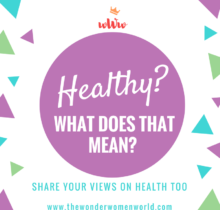WHAT DOES IT MEAN TO BE HEALTHY?

I remember I was very young, when I realized that I was too thin for a growing teen. There were frequent questions on whether I ate enough, whether I was active enough, given unsolicited advice by people on how to put on weight.
If you’re hearing of ‘fat shaming’ today, there were a bunch of us who’ve been or are even now ’skinny shamed’. Most of the advise was well meaning, with good intent but unwelcome nevertheless.
Given this background, I’ve always wondered what the term ‘healthy’ means to people. Does it mean looking chubby and rosy cheeked, or does it mean lean and bones sticking out. Does it mean having heaps of rice loaded on the plate and finishing it up, or eating just about enough and letting the body decide.
Being healthy for me is a very subjective term. It may mean having small portions of food that make me feel light one day, or gorging on a large burger or chicken popcorns the next. It may also be my state of my mind on a given day, the activities I’m able to pursue without feeling tired and lethargic. I may run on two good filling meals on one day or a bowl of fruits eaten frequently thereafter.
My perception of health isn’t based on just the physical state alone, but a balance of the mental and emotional too. It is the ability of the body to acquire, convert, allocate, distribute and utilise energy with maximum efficiency (Wikipedia).
Health, till the age of around 27 is the body building up reserves, working to its maximum efficiency, converting energy quickly and optimally. Post 30, the body loses steam, slows down, takes inordinate amounts of time to digest and convert energy. Result is lethargy, sluggishness, tiredness and double the time getting back to optimal levels.
In women, more than men, the effects of wear and tear and internal damage is harsh and long lasting. Despite men and women going through hormonal changes after puberty, women’s bodies suffer a greater toll with menstruation and during childbirth. The stretching of the pelvis, organs pushed down and out internally, stomach muscles stretched thin, followed by hormonal upheaval weakens the body and occurs over years. This return to a previously healthy state happens very slowly, sometimes not at all or brings with it, its own set of complications.
What then defines health for women?
What are some common worrying signs, health parameters we must all be aware of?
PHYSICAL HEALTH
A woman’s physical health isn’t defined by how fat or thin she is, how much food she eats and the exercise she does, because there can never really be a ‘one-size-fits-all’ parameter.
Having said that, there are a few key signs/symptoms that women must be aware of and keep track at all times.
* Tiredness & Lethargy – Most women suffer from this at some point of time in their life. The common causes for lethargy in a majority of women are severe anaemia (often childhood related), hormonal changes (accompanied by other visible signs like palpitations & elevated BP) and insufficient nutrition. If tiredness is persistent with no rest or sleep alleviating it, then a thorough checkup is a must to identify an underlying cause.
- Sallow skin, brittle nails & excessive hair loss – Women live with bad skin and hair for years, when all it takes is often a little care and treatment to manage it. These visible signs must never be ignored, for they hint at something deeper. It is said that the skin is a window to a person’s state of well being. Vitamin deficiency (Biotin) is the most cited cause of this, although anaemia may not be too far behind.
- Persistent pain – Women can live with large amounts of pain, sometimes for a major portion of their life. Pain is a physical sign that something is wrong and cannot be ignored or masked with painkillers. Whether its sharp & radiating (as happens in urinary infection), heavy and throbbing (sinusitis) or tiny tingling (nerve pain), understanding it, its persistency and scale will help get at the root of the problem. Pain when identified, can sometimes be the only fine line between life and death.
- Abnormal growths/bumps/inflammations – Not until breast cancer began to become so common, did women understand the importance of checking for lumps and swellings on themselves. In reality, there are a whole group of problems that first showcase as body swellings, sometimes in large numbers and often solitary – cysts, fibroadenomas, warts being just a few.
MENTAL/EMOTIONAL HEALTH
There’s tonnes of literature on mental & emotional health. Yet for the majority of women, it is something difficult to identify and societal stigmas abound in plenty.
Whether its something you’ve noticed in yourself, or in another women close to you, it is important to identify, reach out and get intervention as quickly as possible.
- Listlessness & loss of interest – A happy, cherubic person suddenly going quiet and listless is very worrying. While genuine reasons for this may exist, often times women go through such changes during a major upheaval in their life. While stoicism isn’t our forte, we react and show emotions readily. When a person displays persistent listlessness, it needs to be investigated.
- Continually upset & crying – Women are emotional but again this is often hormones playing up. Sudden shedding of tears, persistent self-blame, decreased self-worth for no obvious reason must be considered as red flags. While sudden news, life changes are often triggers, the underlying reason may be altogether something else.
- Excessive emotions – Strong reactions to simple actions, whether hysteria, anger, laughter or anxiety, are hard to dismiss particularly when the person doesn’t display it at the other times. If a family friend, helper or relative is displaying it then try to address it without seeming to intrusive.
With women, hormones are continually on a surge and ebb particularly during PMS. Poly cystic disease, endometriosis, amenorrhoea and other conditions can further aggravate them.
Good health is a delicate balance of several parameters in a woman. Despite her strong exterior and ability to manage many tasks fluidly, her body is constantly going through several upheavals, some known, some unnoticed. Observing our bodies is the only way to take care of ourselves and preempt any significant health upheaval.
-Charmaine Kenita
The author is a food writer, doctor, yogi and a believer in the power of stories. She writes on a variety of subjects, is a branding expert, content curator and founder of Out ‘O’ Box Content, a boutique content and social media firm. She also teaches yoga, works on recycled projects and is a passionate voice behind the city’s environmental causes.
Other articles by Charmaine Kenita
Disclaimer: The views and opinions expressed in this article are those of the author and do not necessarily reflect the views of The Wonder Women World.


One comment